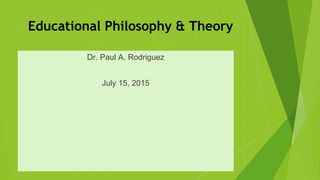Educational Philosophy & Theory2
•Als PPT, PDF herunterladen•
4 gefällt mir•3,289 views
Melden
Teilen
Melden
Teilen

Empfohlen
You, the Teacher, as a Person in Society reported by Randy. PacquiaoThe Teaching Profession - Chapter 1 You, the Teacher, as a Person in Society ...

The Teaching Profession - Chapter 1 You, the Teacher, as a Person in Society ...Randy Magdugo Pacquiao
Weitere ähnliche Inhalte
Was ist angesagt?
You, the Teacher, as a Person in Society reported by Randy. PacquiaoThe Teaching Profession - Chapter 1 You, the Teacher, as a Person in Society ...

The Teaching Profession - Chapter 1 You, the Teacher, as a Person in Society ...Randy Magdugo Pacquiao
Was ist angesagt? (20)
Implication of Idealism and Naturalism to Philippine Education

Implication of Idealism and Naturalism to Philippine Education
The Teaching Profession - Chapter 1 You, the Teacher, as a Person in Society ...

The Teaching Profession - Chapter 1 You, the Teacher, as a Person in Society ...
Philosophical Foundation of Curriculum-Arnold Duping

Philosophical Foundation of Curriculum-Arnold Duping
Andere mochten auch
Mixed method design is often noted as a methodology capitalizing on the advantage of in-depth study in qualitative approaches and the power of generalization in quantitative approaches.
To be useful, acknowledging the fundamental assumption underpinning these two approaches is paramount. Qualitative approach is individualistic where the findings are rich in explaining a phenomenon of interest in context while quantitative approach is normative where the findings represent an average pattern of a phenomenon of interest in a population. Making Sense of Mixed Methods Design in Health Research

Making Sense of Mixed Methods Design in Health ResearchDepartment of Family Medicine, Universiti Kebangsaan Malaysia
Andere mochten auch (20)
John dewey’s philosophy and educational implication

John dewey’s philosophy and educational implication
Making Sense of Mixed Methods Design in Health Research

Making Sense of Mixed Methods Design in Health Research
Using technologies to develop capabilities with people living with intellectu...

Using technologies to develop capabilities with people living with intellectu...
Ähnlich wie Educational Philosophy & Theory2
Ähnlich wie Educational Philosophy & Theory2 (20)
Part-III-Philosophical-Foundations-of-Education (1).docx

Part-III-Philosophical-Foundations-of-Education (1).docx
philosophical foundation of education, realism ,idealism ,existential pragmtism

philosophical foundation of education, realism ,idealism ,existential pragmtism
Mehr von Dr. Paul A. Rodriguez
Mehr von Dr. Paul A. Rodriguez (20)
Differentiating Instruction in the Regular Classroom

Differentiating Instruction in the Regular Classroom
Educational Philosophy & Theory2
- 1. Educational Philosophy & Theory Dr. Paul A. Rodriguez July 15, 2015
- 2. John Dewey October 20, 1859 – June 1, 1952 American Philosopher/Psychologist/Educational Reformer Primary figure associated with the philosophy of pragmatism and is considered one of the founders of functional psychology. Belief in democracy which considered two fundamental elements: schools & civil society which need attention and reconstruction to encourage experimental intelligence and plurality.
- 3. Paulo Freire Promoted Problem Posing Education wherein the student takes part in their education versus the teacher providing all of the input. Believes we need to be tolerant. It is our ethical and political duty to be tolerant. Literacy is a fundamental chapter of education. Language is the thinking of ideology and power.
- 4. Laurence Robert Cohen Developed the philosophy of Transformative Pedagogy wherein people remember what they do and see. Environment where students can learn is important. Assure students they have the ability to think. Reexamine student’s basic personal meaning perspective before they can critically reflect sufficiently to experience reassessment. Bring the students face-to-face with the reassessment of their past. Students need to find themselves as individuals and as a class. Critical reflection is necessary in order for students to discover skills and intelligences necessary to rearrange the structure of the world.
- 5. My Teaching Philosophy The following questions serve to shape an educational philosophy: What is the purpose of education? What content & skills should schools teach? How should schools teach this content? What are the proper roles for teachers & students? How should learning be measured?
- 7. Educational Philosophy & Theory • What is an educational philosophy? • An educational philosophy is one’s belief as to how education should take place.
- 8. Educational Philosophy & Theory What is the difference between Teacher-Centered Philosophies & Student-Centered Philosophies? Teacher-Centered Philosophies are based on teacher input versus student-centered philosophies wherein students collaborate and knowledge is discovered.
- 9. Educational Philosophy & Theory What are the five major philosophies of education? •Perennialism: Perennialists believe that education, like human nature, is a constant, should focus on developing rationality, and is a preparation for life. Students should be taught through structured study. •Idealism: Idealist believe truth is to be found in the consistency of ideas. Teachers would be models of ideal behavior. Students would have a somewhat passive role by receiving and memorizing the reporting of the teacher.
- 10. Educational Philosophy & Theory What are the five major philosophies of education? •Realism: The job of the teacher would be to teach students about the world. Topics such math and science would be ideal as it applies to the here-and-now. Students would be taught factual information for mastery. Classrooms would be highly ordered and disciplined. •Experimentalism: For the experimentalist, the world is ever changing. Reality is what is actually experienced. They openly accept change and continually seek to discover new ways to improve society. Emphasis is placed on social subjects and experiences. Learning would occur through problem-solving or inquiry.
- 11. Educational Philosophy & Theory What are the five major philosophies of education? •Existentialism: The existentialist sees the world as personal subjectivity wherein goodness, truth, and reality are individually defined. Reality is a world of existing, truth subjectively chosen, and goodness a matter of freedom.
- 12. A Comparison of the Five Educational Philosophies Comparison Chart:
